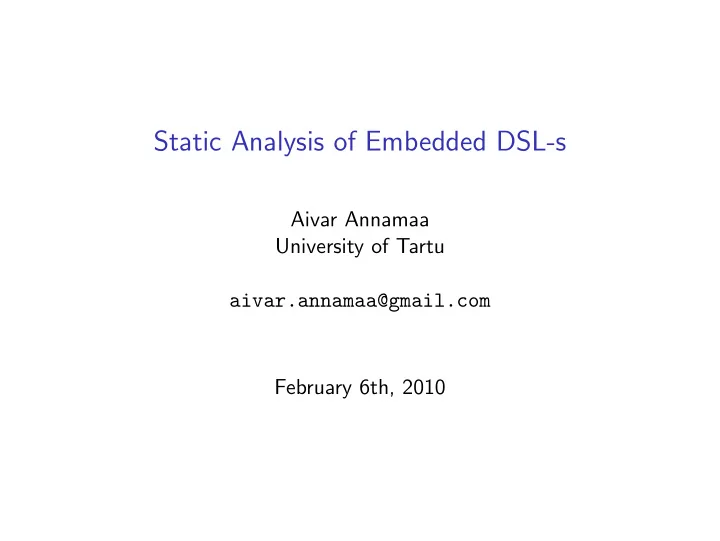

Static Analysis of Embedded DSL-s Aivar Annamaa University of Tartu aivar.annamaa@gmail.com February 6th, 2010
Problem ◮ DSL-s are often embedded as string literals in a GPL ◮ SQL, RegEx, HTML ◮ Mistakes pop up at runtime ◮ Especially error prone together with conditional concatenation
Example: SQL in Java ... String sql = "select id, name from persons"; if (dept != null) { sql += "where dept = ?"; } // following may give runtime error PreparedStatement stmt = conn.prepareStatement(sql); ...
Static analyzer for SQL embedded into Java Should detect SQL errors at compile time ◮ Locate hotspots ie. method calls that cause runtime errors when given bad SQL as argument (eg. Connection.prepareStatement ) ◮ Construct abstract value of argument expression ◮ Check abstract value for errors: ◮ perform exhaustive testing on possible concrete values against real DB ◮ (or try to parse the abstract value directly) ◮ (Analyze correct usage of ResultSet) ◮ (Keep track of different DB schemas used in the program)
Aims ◮ Be sound: no errors from analyzer ⇒ no SQL prepare errors at runtime ◮ Be fast enough for on-line usage (while typing), even in case of big projects ◮ Be precise for common idioms of SQL construction ◮ single literals and unconditional intra procedural concatenation (90%) ◮ concatenations with few conditions or simple inter procedural constructions (9%) ◮ Be tolerable in rare complex cases (loops, many conditions, deep chains of method calls, etc.)
Conceptual framework for constructing abstract string ◮ Extract program slice for string expression at hotspot ◮ Perform constant propagation analysis (on that slice) ◮ for each CFG node compute abstract environment – a mapping from string variables to abstract strings Env: Var -> AbsStr AbsStr ::= ConstStr String | Seq AbsStr AbsStr | Choice AbsStr AbsStr | IntStr | AnyStr
Expression evaluator Computes abstract value of given expression in given environment eval (StringLiteral s) env = ConstStr s eval (Var n) env = env n eval (Concat exp1 exp2) env = Seq (eval exp1 env) (eval exp2 env) eval (IntExp e) _ = IntStr eval _ _ = AnyStr
Environment transformer for statements Start at entry node with empty environment and work towards hotspot using environment transformer ( tr ) at each statment tr (Assign var expr) oldEnv = update in var (eval expr) tr (Block []) oldEnv = oldEnv tr (Block s:ss) oldEnv = tr (Block ss) (tr s oldEnv) tr (IfElse ifBlock elseBlock) oldEnv = merge (tr ifBlock oldEnv) (tr elseBlock oldEnv) merge unions two environments pointwise using Choice
Handling loops using cheating approach ◮ For efficiency (and termination), pretend that loop bodies execute always once or twice ◮ no need for fixpoint computation ◮ For soundness add AnyStr as choice to all variables assigned in the loop-body tr (Loop header body) oldEnv = merge (merge onceEnv twiceEnv) anyEnv where onceEnv = tr body oldEnv twiceEnv = tr body onceEnv anyEnv = anyStrForAllAss body
Going interprocedural ◮ Expression may use current method parameters ◮ actual arguments at all possible callsites are analyzed ◮ Expression may include method calls ◮ All possible target methods get evaluated context-sensitively ◮ In both cases, same evaluation procedure is used recursively ◮ Depth of such recursion is limited: ◮ when limit is reached, then AnyStr is returned ◮ gains efficiency in deep chains of method calls and avoids problems with recursive methods ◮ Needs class hierarchy analysis for better precision in case of polymorphic methods
Interpretation of the result ◮ Constructing abstract string always terminates, because of special treatments of loops and limited depth in interprocedural analysis ◮ If resulting abstract string contains AnyStr , then corresponding hotspot is reported as possible source of errors ◮ Otherwise: ◮ all possible concrete strings are generated from abstract string ( IntStr gets translated to ’1’) ◮ each string is sent to DB for parsing and validating ◮ if any of them raises an error, then hotspot is reported as possible source of errors
Opportunity for modularity ... String getQuery(String grouper) { String sql = "select " + grouper + " as gr," + "sum(income) as total_income " + "from results "; if (!grouper.lowercase().equals("dept")) { sql += " where period_year > 1970"; } sql += "group by " + grouper; } ... stmt = conn.parseStatement(getQuery("dept")); ... stmt = conn.parseStatement(getQuery("year")); ...
Modular dataflow analysis ◮ Continuous analysis (while typing) would be really nice ◮ Doing full-program analysis after each code edit may not be feasible ◮ General idea of modular interprocedural dataflow analysis: ◮ each relevant method is analyzed independently and abstract summary of it’s effect is cached (eg. in form of a table or graph) ◮ later, if analysis of this method is needed in some context then it’s cached summary is interpreted (instead of analyzing it again) ◮ Opportunity for metaprogramming: ◮ compiling method summaries to real Java methods might give better performance than interpreting summary data each time
Current implementation ◮ Implemented in Java as an Eclipse JDT plugin ◮ Works in “bacth-mode”, no modular on-line analysis yet ◮ Program slicing not explicitly present in the algorithm ◮ Working directly on AST, without separate CFG ◮ Abstract string construction works from hotspot backwards ◮ Can analyse business module of Compiere ERP system (200K LOC, 250 hotspots) in less than a minute ◮ for 20 hotspots, result included AnyStr ie. at some point analyzer had said “not sure” ◮ remaining 230 results expanded to 260 different concrete strings ◮ 8 concrete strings didn’t pass validation by DB ◮ 4 of them real bugs
A screenshot
Recommend
More recommend